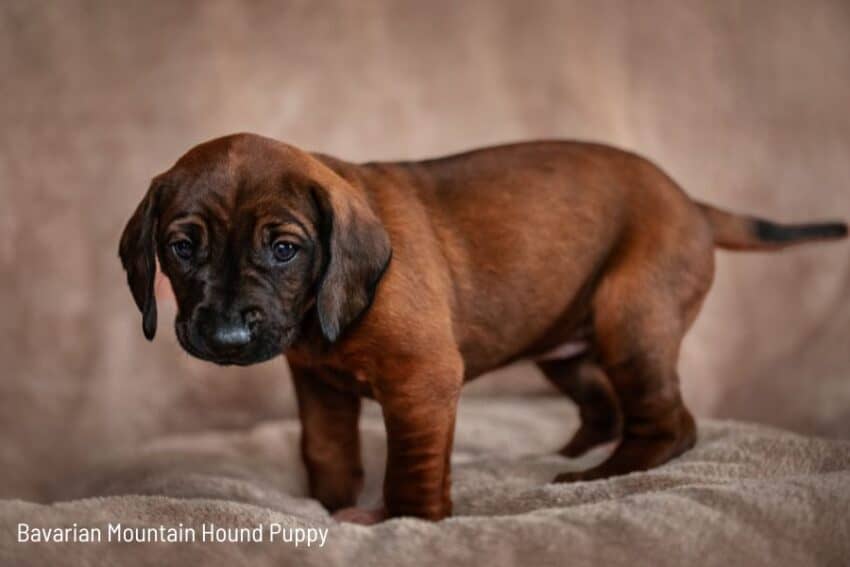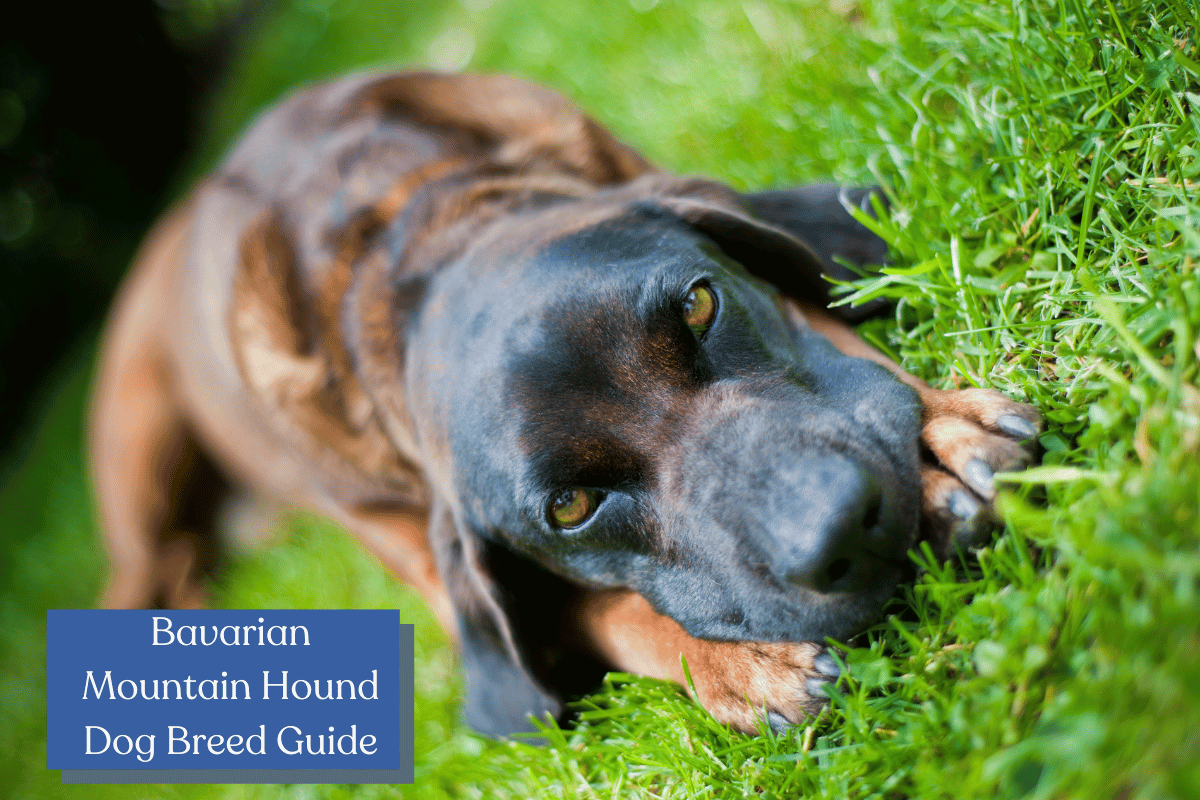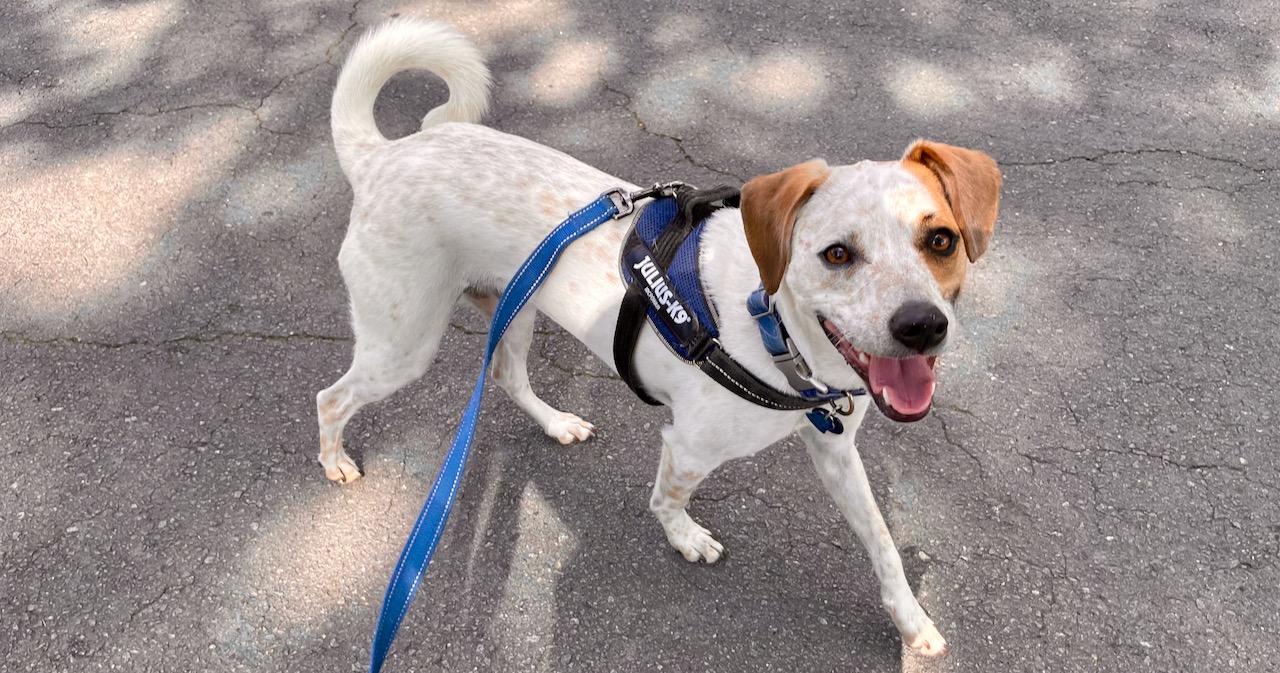Bavarian Mountain Hounds are an easy dog to love. These loyal companions have adorable appearances, delightful personalities, and aren’t too high-maintenance. It’s no wonder why so many people are looking into them as their next family pet.
So I thought creating a guide to examine this breed would be wise. It’ll help you decide whether or not a Bavarian Mountain Hound is ideal for your home.
Complete Guide to the Bavarian Mountain Hound Dog Breed
Learning about a dog breed before bringing it into your home is always smart. It’s an easy way to ensure there aren’t surprises about owning a particular one. After all, every breed has a different origin, set of needs, and temperament.
I’ll walk you through all these topics and several others to ensure you become a Bavarian Mountain Hound expert. It’ll soon become apparent if this breed could be a suitable fit.
Bavarian Mountain Hound Dog’s History and Origin
Bavarian Mountain Hounds are considered a German breed, developed around the 1870s. It makes them a younger canine compared to many other hounds. But these hounds didn’t take long to make a mark and gain a footing.
After all, their strong sense of smell made them excellent at tracking animals. So hunters used them on hunts to ensure they could always find their prey and kill. They’d let these hounds loose, and the animals were found much quicker than without them.
Bavarian Mountain Hounds didn’t only make hunting more effective with their noses, either. Their unique builds allowed them to travel in mountain ranges without issues. It was all made possible by Baron Karg-Bebenburg (Reichenhall of Bavaria), who used Tyrolean Scent Hounds and Hanoverian Bloodhounds to create this magnificent breed.
Once developed, Bavarian Mountain Hounds became fixtures on hunts. Most hunters and gamekeepers even prefer them over all other hounds. Their abilities to travel rough terrain and long distances perfectly matched the new requirements of more advanced firearm hunting.
Over the next few decades, their popularity continued to increase. Bavarian Mountain Hounds even got their own club in 1912 dedicated to the breed. Eventually, these hounds started popping up worldwide, including the United States.
The American Kennel Club even accepted them into their Foundation Stock Service in 2016. It won’t be too long until Bavarian Mountain Hounds become fully recognized. But until then, pet owners will continue enjoying them as loyal and faithful companions.

Bavarian Mountain Hound Dog Physical Characteristics and Appearance
Bavarian Mountains Hounds are known for their muscular builds. It’s their most defining feature when you first encounter them. It makes sense considering the main reason these dogs were developed in the first place.
Owners can expect them to be more medium-sized rather than being a large breed: the largest ones rarely get over 55 pounds. But it doesn’t stop them from being formidable and strong when encountering potential threats.
On a similar note, these hounds will have broad, stout muzzles. It gives them strong, solid jaws that help with hunting and similar activities. In other words, no small prey animal will enjoy being hunted and bitten by these muscular dogs.
Meanwhile, a Bavarian Mountain Hound’s short, dense coat will fit closely on its body. It has a certain level of harshness to it when combing or petting it. Potential owners will also find the available colors are somewhat limited as these dogs only come in brindle, fawn, or red.
But these are only a small number of this breed’s notable characteristics. However, I don’t want to make this section overbearing, so I summarized the other essentials in a list:
- Weight: 44 to 55 pounds
- Height: 17 to 20 inches
- Notable Features: Broad muzzle with solid jaw, black/dark red nose, wide nostrils, brown eyes, hang-down ears, well-developed chest, and overall muscular build
- Coat Type: Short-medium, dense coat with straight fur
- Available Colors: Brindle, fawn, and red
- Lifespan: 10 to 14 years
If you’re a visual person, I’d recommend this short video. It shows these dogs in action to provide a better demonstration of their size. Plus, they look so cute while enjoying the outdoors!
Bavarian Mountain Hound Dog’s Temperament
A Bavarian Mountain Hound’s temperament won’t have trouble fitting into a proper home. These hounds have a reserved personality that matches well with most families. It also doesn’t hurt that this breed is known for being rather intelligent among other medium-sized dogs.
As a result, they often adapt much easier to various situations than other breeds. I’d only advise ensuring your hound has a large yard to explore and run. These dogs are known for being active and require numerous sources of physical/mental stimulation.
Playtime is where these dogs shine as they love playing games with their owners. So prospective owners should have toys or other activities to keep them busy. It may be a little more time-consuming than other breeds, but it does help quicken your bond.
Once the bond forms, you’ll have difficulty finding more loyal companions. Bavarian Hounds are loyal to a fault and will do anything for their families. These dogs love nothing more than gaining attention and receiving positive reinforcement from their owners.
But there’s one side-effect to their overwhelming loyalty. This breed has a reputation for separation anxiety, which can be a challenging obstacle to overcome. So it’s vital to socialize them early while getting them used to being alone.
Furthermore, this issue is a reason why many experts suggest them for larger families. Your dog won’t have separation anxiety problems if there’s a family member always at home! Of course, you still want to ensure they feel comfortable being alone.
One final noteworthy personality trait is their lack of aggression towards familiar people. It makes them great family pets and comfortable with other dogs (small pets are not ideal).
Are Bavarian Mountain Hound Dogs Easy to Train?
Bavarian Mountain Hounds aren’t overwhelmingly tough to train. However, you will need some patience and effort to achieve a successful outcome. If I were to rank them on trainability, I’d put it at slightly above average.
For instance, their intelligence does work in a trainer’s favor when going about these sessions. It opens up the floodgates to a wide range of commands and tricks. However, one area where these dogs don’t seem to excel is recall.
One way to counteract these issues is by using positive reinforcement rewards. Most owners have found treats to be an excellent way of preventing recall training issues. These hounds seem to respond well since they’re food-motivated.
Off-leash training is another problematic area for these hounds. Treats and affection can work wonders, but it does require significant practice. After all, fixing their natural behavior of chasing small prey animals is difficult. So it’s easy to see where the issue arises.
It’s why I often caution owners about keeping them off-leash in public or unsecured places. It’s just a recipe for disaster if their chasing behavior has been trained out of them. If you’re dead set on letting them off-leash, please have a professional train them properly. I also recommend investing in a good dog tracking collar. That way, if they do get lost, you can quickly find them.
But aside from these minor issues, training them should be easy. It just requires a bit more patience and effort than more popular dog breeds. So they might not be an ideal match for a first-time owner or someone who doesn’t have spare time.
Common Health Issues for Bavarian Mountain Hound Dogs
Health is one of the more exciting areas of Bavarian Mountain Dogs. After all, these dogs are considered relatively healthier than most breeds. So potential owners can feel good about reaching their lifespan expectancy without much worry.
But even the healthiest breeds still have common issues owners need to acknowledge. Here’s a quick list of some conditions, which have affect these hounds:
1. Hip Dysplasia
Hip dysplasia is much more common in larger breeds but does affect medium and small breeds occasionally. It refers to when the hip joints don’t fit into place correctly. So it ends up causing your dog swelling, pain, and eventually arthritis.
Owners who think this condition may be causing their dog problems should look for limping, lameness, and trouble with jumping. These are all indicators of hip dysplasia, and a vet visit needs scheduling immediately.
If your dog is diagnosed with hip dysplasia or other joint conditions, you may want to consider putting him on a good supplement, like Hemp & Hips Plus CBD.

2. Progressive Retinal Atrophy
Progressive retinal atrophy (PRA) is a degenerative disease that attacks the cells inside your dog’s eye. If left untreated, this condition can cause a partial loss of vision or even complete blindness.
As you can imagine, it’s particularly traumatizing to watch a dog lose their vision. So do your best to stay on top of these issues by doing regular eye checks. Look out for symptoms like a reluctance to go outside at night, clumsiness, bumping into objects, and cataracts.
3. Entropion
The last condition to be cautious about is called entropion. Dogs suffering from this condition will have their eyelids roll inward, causing corneal irritation. It ends up being a very unpleasant and uncomfortable situation for your hound.
You don’t want this situation to linger, either, as it can cause eye damage. So you must address it immediately and look for symptoms like eye discharge, excessive discharge, and swelling.

Exercise Requirements for Bavarian Mountain Hound Dog
Keeping a Bavarian Mountain Hound active is crucial in reigning in its destructive behaviors. So if you want your blinds and furniture intact, ensure they get an hour or two of daily exercise. I’d also advise having a large yard or garden to let them release any pent-up energy.
Meeting those requirements should provide more than enough physical stimulation. But it’s critical to keep their brains engaged and prevent boredom, as well. You may consider investing time and effort in more complex training, or changing their routine regularly.
Both activities will keep them from becoming bored and resorting to entertaining themselves. It doesn’t hurt to take them on runs or hiking, either. Honestly, any activity that brings new smells and settings into their lives is a good idea as long as it’s safe. You can also invest in some great interactive dog toys that engage their minds and bodies.
Care and Grooming Requirements for Bavarian Mountain Hound Dog
The first step to taking care of any dog is keeping up with regular vet checkups. It’s a key component in checking and addressing problematic health issues early. Otherwise, these conditions could linger and cause severe consequences for your dog’s overall health.
Aside from regular vet visits, owners will want to do daily ear checks. Look for pests and debris that have climbed aboard your dog’s cute hanging ears. If there are any, remove them using the proper tools and contact a vet with any questions.
Oral hygiene is essential with this breed as they often have dental issues. I’d suggest daily brushing using a dog-specific toothpaste and brush to counteract it. It should be enough to ensure their teeth remain in excellent shape.
As for grooming, this breed has short fur that ensures the requirements aren’t excessive. Weekly brushing should be adequate to prevent any matting or other issues. You also should bathe them every two months to help the coat reach its full potential.
Nail trimming is another necessary task that needs doing once or twice a month. Some people aren’t comfortable doing it at home, which is understandable. There’s no shame in contacting a professional groomer.
Bavarian Mountain Hound Dog FAQs
How Much Does a Bavarian Mountain Hound Cost?
Bavarian Mountain Hounds from a breeder will cost around $800. But sometimes, prospective owners can find them at rescues or shelters for much cheaper. Whenever possible, adopt before you shop.
Do Bavarian Mountain Hounds Shed?
Owners can expect their Bavarian Mountain Hounds to shed throughout the year. But their shorter coat keeps the shedding manageable, especially to breed like a Golden Retriever.
Are Bavarian Mountain Hounds Aggressive?
Bavarian Mountain Hounds aren’t aggressive towards people. Instead, they have a calm and balanced temperament that ensures they’re an excellent addition to most homes.
Conclusion
Overall, Bavarian Mountain Hounds are fabulous family pets with a fun-loving and calm personality. However, they do require significant exercise and attention to prevent certain behavior issues. So prospective owners who can’t meet those needs should look at other breeds.
Do you have a Bavarian Mountain Hound? Let me know in the comments and ask any other questions that popped into your head. I’d love to continue the conversation about this magnificent breed!




